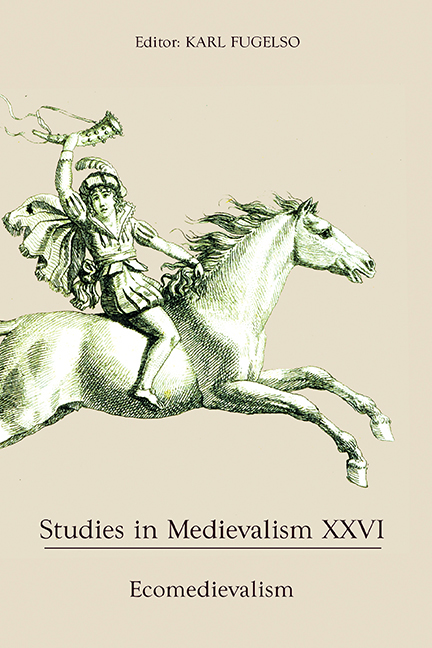Book contents
- Frontmatter
- Studies in Medievalism
- Acknowledgments
- Contents
- List of Illustrations
- Editorial Note
- I Ecomedievalism: Some Perspective(s)
- II Interpretations
- Fragmentary Dreams: John Aubrey's Medieval Heritage Construction
- Charter Horns and the Antiquarian Imagination in Early Modern England
- Giving Voice to Griselda: Radical Reimaginings of a Medieval Tale
- Medieval and Futuristic Hells: The Influence of Dante on Ellison's “I Have No Mouth and I Must Scream”
- Reading Westeros: George R. R. Martin's Multi-Layered Medievalisms
- Modernity in the Middle: The Medieval Fantasy of (Coopted) Feminism in Disney's Maleficent
- Future Medieval: (Neo)Medievalism in Babylon 5 and Crusade
- Cosmopolitan Anxieties and National Identity in the Netflix Marco Polo
- Mapping Everealm: Space, Time, and Medieval Fictions in The Quest
- Medievalisms of the Mind: Undergraduate Perceptions of the “Medieval” and the “Middle Ages”
- Mask of the Medieval Corpse: Prosopopoeia and Corpsepaint in Mayhem's De Mysteriis Dom Sathanas
- Contributors
- Miscellaneous Endmatter
Mapping Everealm: Space, Time, and Medieval Fictions in The Quest
from II - Interpretations
Published online by Cambridge University Press: 15 September 2017
- Frontmatter
- Studies in Medievalism
- Acknowledgments
- Contents
- List of Illustrations
- Editorial Note
- I Ecomedievalism: Some Perspective(s)
- II Interpretations
- Fragmentary Dreams: John Aubrey's Medieval Heritage Construction
- Charter Horns and the Antiquarian Imagination in Early Modern England
- Giving Voice to Griselda: Radical Reimaginings of a Medieval Tale
- Medieval and Futuristic Hells: The Influence of Dante on Ellison's “I Have No Mouth and I Must Scream”
- Reading Westeros: George R. R. Martin's Multi-Layered Medievalisms
- Modernity in the Middle: The Medieval Fantasy of (Coopted) Feminism in Disney's Maleficent
- Future Medieval: (Neo)Medievalism in Babylon 5 and Crusade
- Cosmopolitan Anxieties and National Identity in the Netflix Marco Polo
- Mapping Everealm: Space, Time, and Medieval Fictions in The Quest
- Medievalisms of the Mind: Undergraduate Perceptions of the “Medieval” and the “Middle Ages”
- Mask of the Medieval Corpse: Prosopopoeia and Corpsepaint in Mayhem's De Mysteriis Dom Sathanas
- Contributors
- Miscellaneous Endmatter
Summary
In the summer of 2014, medieval fantasy met reality television in The Quest, a part-scripted, part-competition show in which a group of twelve contemporary contestants are “transported” through real/mystical space into a medievalist universe to save the fictional land of Everealm, a fantasy world whose subjects were being terrorized by a villain known as Verlox, the Darkness. Everealm, a land of twelve kingdoms, had been ravaged, leaving only Castle Sænctum, ruled by Queen Ralia (played by Susanne Gschwendtner), standing. Each week the contestants, called “paladins,” are tasked with helping to drive back the forces of darkness in a scripted narrative that included a series of real challenges at its center. In every episode, as part of the advancing narrative, the paladins take part in some kind of contest; the winners move on, while the losers must go before the Fates. The Fates then issue their own challenge, the winner is saved, and one paladin is voted off by his or her fellow contestants. In the end, the final paladin standing is allowed to reassemble the Sun Spear (a mystical weapon from Everealm's “history”), defeat Verlox (Doug Tait), and be named the “One True Hero.”
The show's title plays an open hand. No academic medievalist or hardcore fantasy geek can hear the word “quest” without thinking geography; quests, whatever else they may do, move through space, both real and imagined, interior and exterior. The show's geography offers a complex nexus of reality and fiction; set in a real castle in Austria, in a fictional land, with real, contemporary contestants, in an imagined past that echoes both the real Middle Ages and the fantasy Middle Ages of J. R. R. Tolkien and George R. R. Martin, The Quest creates an attentive map of space and time, reality and fiction. By adding a scripted story to the reality-television concept, The Quest calls its viewers’ attention to the fiction underlying the whole enterprise; no reality television is “reality” in any meaningful way.
- Type
- Chapter
- Information
- Studies in Medievalism XXVIEcomedievalism, pp. 195 - 212Publisher: Boydell & BrewerPrint publication year: 2017

